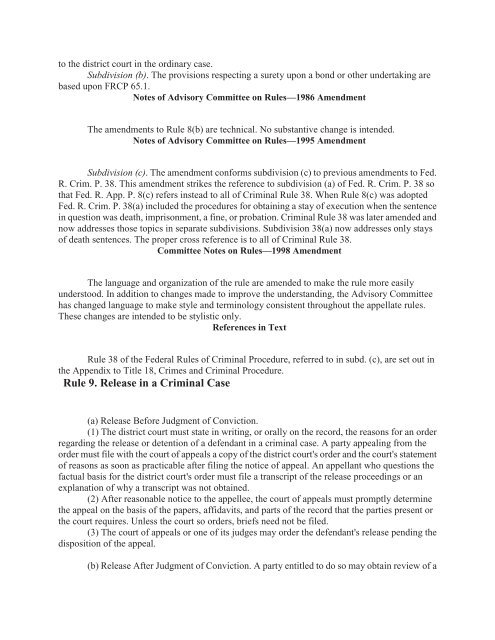Federal Rules of Appellate Procedure 2014-2015, 2014a
Federal Rules of Appellate Procedure 2014-2015, 2014a
Federal Rules of Appellate Procedure 2014-2015, 2014a
Create successful ePaper yourself
Turn your PDF publications into a flip-book with our unique Google optimized e-Paper software.
to the district court in the ordinary case.<br />
Subdivision (b). The provisions respecting a surety upon a bond or other undertaking are<br />
based upon FRCP 65.1.<br />
Notes <strong>of</strong> Advisory Committee on <strong>Rules</strong>—1986 Amendment<br />
The amendments to Rule 8(b) are technical. No substantive change is intended.<br />
Notes <strong>of</strong> Advisory Committee on <strong>Rules</strong>—1995 Amendment<br />
Subdivision (c). The amendment conforms subdivision (c) to previous amendments to Fed.<br />
R. Crim. P. 38. This amendment strikes the reference to subdivision (a) <strong>of</strong> Fed. R. Crim. P. 38 so<br />
that Fed. R. App. P. 8(c) refers instead to all <strong>of</strong> Criminal Rule 38. When Rule 8(c) was adopted<br />
Fed. R. Crim. P. 38(a) included the procedures for obtaining a stay <strong>of</strong> execution when the sentence<br />
in question was death, imprisonment, a fine, or probation. Criminal Rule 38 was later amended and<br />
now addresses those topics in separate subdivisions. Subdivision 38(a) now addresses only stays<br />
<strong>of</strong> death sentences. The proper cross reference is to all <strong>of</strong> Criminal Rule 38.<br />
Committee Notes on <strong>Rules</strong>—1998 Amendment<br />
The language and organization <strong>of</strong> the rule are amended to make the rule more easily<br />
understood. In addition to changes made to improve the understanding, the Advisory Committee<br />
has changed language to make style and terminology consistent throughout the appellate rules.<br />
These changes are intended to be stylistic only.<br />
References in Text<br />
Rule 38 <strong>of</strong> the <strong>Federal</strong> <strong>Rules</strong> <strong>of</strong> Criminal <strong>Procedure</strong>, referred to in subd. (c), are set out in<br />
the Appendix to Title 18, Crimes and Criminal <strong>Procedure</strong>.<br />
Rule 9. Release in a Criminal Case<br />
(a) Release Before Judgment <strong>of</strong> Conviction.<br />
(1) The district court must state in writing, or orally on the record, the reasons for an order<br />
regarding the release or detention <strong>of</strong> a defendant in a criminal case. A party appealing from the<br />
order must file with the court <strong>of</strong> appeals a copy <strong>of</strong> the district court's order and the court's statement<br />
<strong>of</strong> reasons as soon as practicable after filing the notice <strong>of</strong> appeal. An appellant who questions the<br />
factual basis for the district court's order must file a transcript <strong>of</strong> the release proceedings or an<br />
explanation <strong>of</strong> why a transcript was not obtained.<br />
(2) After reasonable notice to the appellee, the court <strong>of</strong> appeals must promptly determine<br />
the appeal on the basis <strong>of</strong> the papers, affidavits, and parts <strong>of</strong> the record that the parties present or<br />
the court requires. Unless the court so orders, briefs need not be filed.<br />
(3) The court <strong>of</strong> appeals or one <strong>of</strong> its judges may order the defendant's release pending the<br />
disposition <strong>of</strong> the appeal.<br />
(b) Release After Judgment <strong>of</strong> Conviction. A party entitled to do so may obtain review <strong>of</strong> a


















